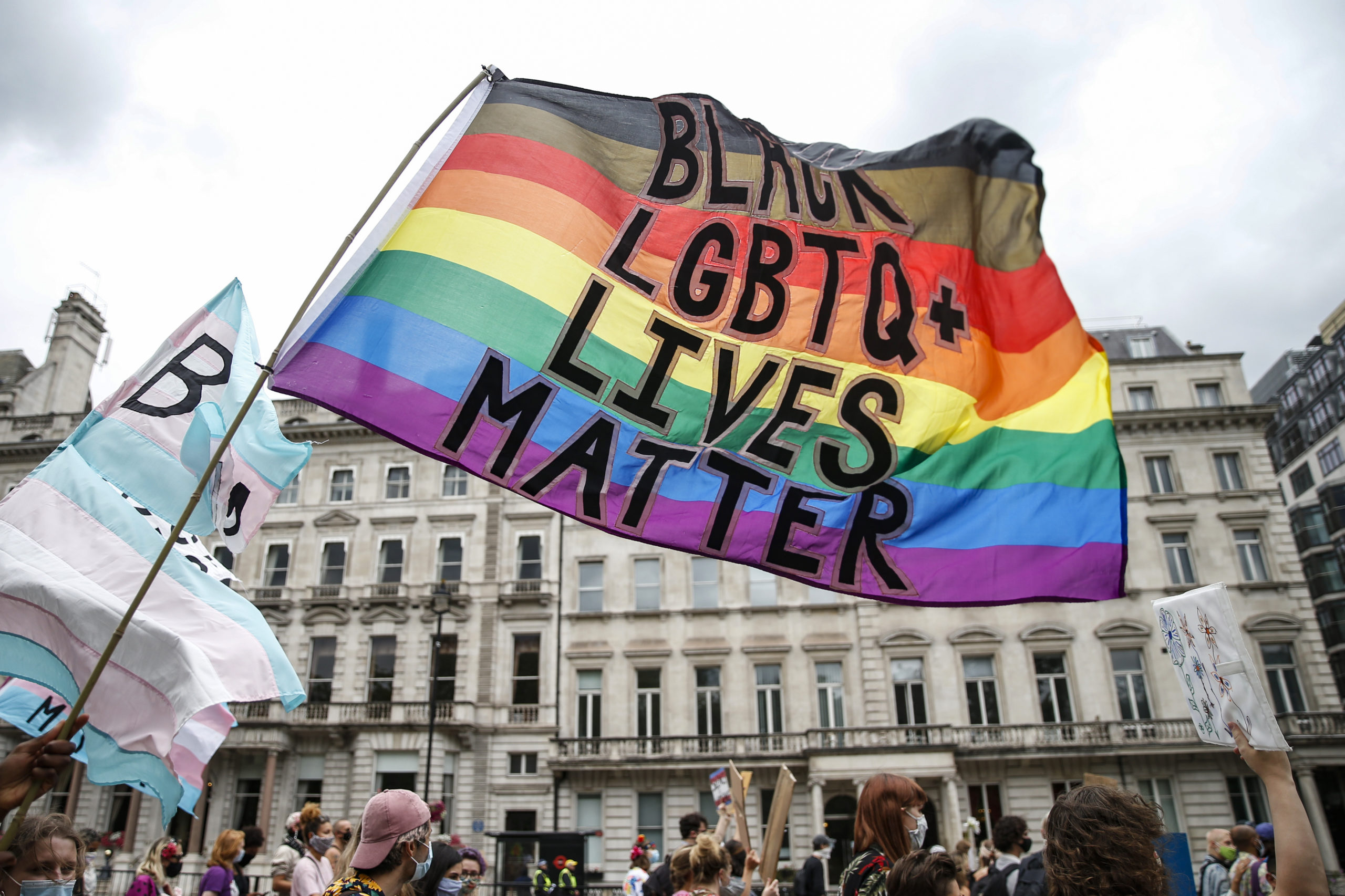Black LGBT+ lives land in the intersection of racism and homophobia. (Getty/Hollie Adams)
Queer Black American men suffer disproportionate levels of police discrimination, which in turn may contribute to increased risks of HIV, depression and anxiety, a study has found.
Research by Rutgers University, published in Social Science & Medicine, asked over 1,100 queer Black men to self-report any incidents of police discrimination, arrests and incarceration.
Between 2017 and 2018, some 43 per cent reported suffering discrimination at the hands of police and other law enforcement.
The results reinforced the notion that injustice is systemic and cyclical, with prior incarceration linked to later police and law enforcement discrimination, which in turn was linked to further arrest.
Lead study author Devin English, assistant professor at the Rutgers School of Public Health, said that despite the evidence suggesting queer Black men in the US may face “some of the highest rates of policing and incarceration in the world… research examining the health impacts of the US carceral system rarely focuses on their experiences”.
“This study helps to address this gap,” he added.
Scott Greenberg, executive director of the LGBTQ Freedom Fund, was unsurprised by the research. He told PinkNews: “With Black people five times more likely to be imprisoned in the US and sexual minorities three-fold more likely to be incarcerated, Black LGBTQ people occupy a reconstitutive crossing of inequity in the criminal legal system.
“One startling demographic disparity aggravates the other, in vicious cycles of poverty and discrimination — in school, employment, policing, family, and society at large.”
Police discrimination may contribute to high levels of HIV among Black queer men.
Respondents were also quizzed on their metal health and sexual behaviour, including their willingness to take PrEP.
Researchers found that those who had suffered high levels of police discrimination were also likely to be at higher risk of HIV and psychological distress, and were more reluctant to take PrEP than their peers.
Those who had been incarcerated or recently arrested were also vulnerable to a higher HIV risk and were less willing to take PrEP.
The study’s authors suggest that police discrimination and incarceration may lead to “a conscious, and potentially adaptive, avoidance of institutions” with a history of discriminating against queer Black men.
Queer Black men are the group most at risk of acquiring HIV in the US. In 2018, they made up 26 per cent of all new HIV diagnoses and 37 per cent of new diagnoses among queer men. Black Americans make up 13 per cent of the US population.
Previous studies have suggested queer Black men are less likely to be on PrEP due to a mistrust of medical establishments, racism on the part of the prescribing physician, internalised and externalised stigma and ineffective messaging among other factors.
As Matthew Hodson, executive director of the UK-based Aidsmap, told PinkNews, it is these many and layered forms of discrimination that is perpetuating the epidemic of HIV among Black queer men, who are “at the intersection of two communities with high HIV rates”.
“Experience of mistreatment in healthcare services, racism, homophobia and a number of structural inequalities all intersect to deter black men who have sex with men from seeking out PrEP as a means of preventing HIV infection,” Hodson said.
“Although the US was the first country to introduce PrEP, take up among Black and Hispanic queer men has always lagged behind that of white men. A recent projection estimated that half of all US Black men who have sex with men were likely to acquire HIV in their lifetime, compared to one in four Hispanic men and nine per cent of white gay or bisexual men.”
He added: “The racial patterns of PrEP use we see in the US are also reflected in other western countries, including the UK, France, and Australia.”
Lisa Bowleg, professor of psychology at The George Washington University and co-author on the study, said the new findings “rightly directs attention to the structural intersectional discrimination that negatively affects Black sexual minority men’s health”.
“Despite experiencing a disproportionate burden of violence and discrimination at the hands of the police, and extremely high carceral rates, Black queer men are largely invisible in discourse on anti-Black policing and incarceration,” added co-author Joseph Carter, doctoral student of health psychology at the City University of New York’s Graduate Center.
“Our study provides empirical support for the intersectional health impacts of police and carceral discrimination that have been systemically perpetrated onto Black queer men.”
